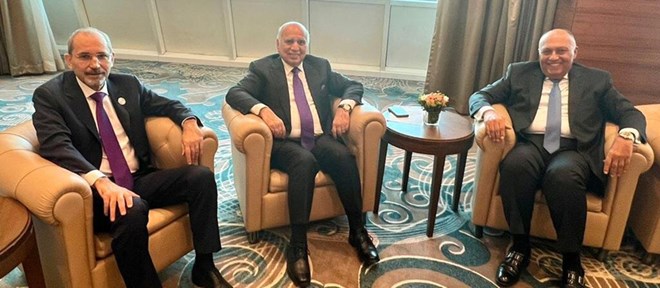Ayman Safadi, the deputy prime minister and foreign minister, and Abshir Omar Jama, the foreign minister of Somalia, met on Monday outside of the 31st regular meeting of Arab foreign ministers.
The gathering was convened in advance of the summit of the Arab League Council, which is slated to take place on November 1-2.
The two parties discussed the outcomes of the summit meeting that His Majesty King Abdullah and the president of Somalia, Hassan Sheikh Mohamud, had in September in New York City, which was conducted in conjunction with the 77th session of the UN General Assembly.
The two ministers reaffirmed their desire to strengthen their bilateral ties, particularly in the area of counterterrorism. Reiterated as a foundation upon which a thorough methodical approach in the fight against terrorism can be developed is His Majesty King Abdullah’s Aqaba process.
Safadi sent condolences to Somalia on behalf of the Kingdom following the deaths of many civilians as a result of two terrorist attacks, one of which attacked the Ministry of Education and a facility for higher learning, as well as another that targeted a hotel in southern Somalia.
Jama praised the Kingdom for taking positions in favour of Somalia’s stability and expressed the desire of his nation to forge bilateral ties.
The minister expressed his gratitude for Jordan’s aggressive efforts to promote security and stability in the area.
In order to prepare for the summit of the Arab League Council, Safadi also met with a number of his counterparts attending the 31st regular session of the Arab foreign ministers conference.
Safadi and the other foreign ministers discussed regional issues, bilateral relations, and coordinated Arab action during these talks.
Additionally on Monday, Safadi had a meeting with Sheikh Ahmed Nasser Al Mohammed Al Sabah, the foreign minister and minister of state for cabinet affairs of Kuwait.
The discussions at the meeting, which was conducted in conjunction with the 31st regular session of the Arab Foreign Ministers’ Meeting, focused on strengthening collaboration and putting His Majesty King Abdullah’s and Kuwait Emir Sheikh Nawaf Al Ahmad Al Jaber Al Sabah’s directions into practise.
The Joint Jordanian-Kuwaiti Higher Committee, which was last held in February 2019 in Amman, was decided to be called during this meeting.
Additionally, they decided to put investment projects into motion as concrete measures to improve economic, trade, and investment relations.
As the primary Arab issue, the Palestinian struggle was discussed along with other regional issues, with a focus on the need to continue cooperating in order to resolve ongoing crises, achieve security and stability, and advance Arab interests.
The two sides emphasised the value of supporting Arab unity in action and the significance of the Arab Summit’s thirty-first session, which was hosted by Algeria.
Safadi and Sheikh Salem lauded the expansion of their bilateral relations, and Safadi wished Sheikh Salem luck in his new role as Kuwait’s foreign minister.
Safadi met with Abdoulaye Bathily, Special Representative of the Secretary General for Libya and Head of the United Nations Support Mission in Libya, on Monday as well, outside of the gathering of Arab foreign ministers.
The two parties discussed the developments of the Libyan crisis during the meeting, with Safadi emphasising the need to find a long-term solution that the Libyan people can support and that will enable them to realise their goals while preserving their resources, the security, and stability of their nation.
Bathily, on the other hand, expressed his gratitude for Jordan’s assistance to Libya and its people while reiterating his nation’s desire to continue coordination and consultation in order to resolve the crisis in a way that brings stability and security to Libya, its citizens, and its neighbouring nations.
At the same occasion, Safadi met with Fouad Hussein, the deputy prime minister and foreign minister of Iraq, and Sameh Shoukry, the foreign minister of Egypt, to confirm the continuance of trilateral collaboration and coordination to advance Arab cooperation.
The relevant ministerial teams in the three countries worked hard throughout the last time period to achieve strategic integration, which was acknowledged by the ministers.
In order to maximise benefits and boost economic potential, they also emphasised the necessity to hasten the implementation of target projects.
Jordan and Egypt have continued to help Iraq, according to Safadi and Shoukry, who also stressed the importance of Iraq’s security and stability for the region’s stability.
In expressing their desire to deepen collaboration and coordination across numerous domains, Safadi and Shoukry congratulated their Iraqi counterpart on the formation of the Iraqi government.

